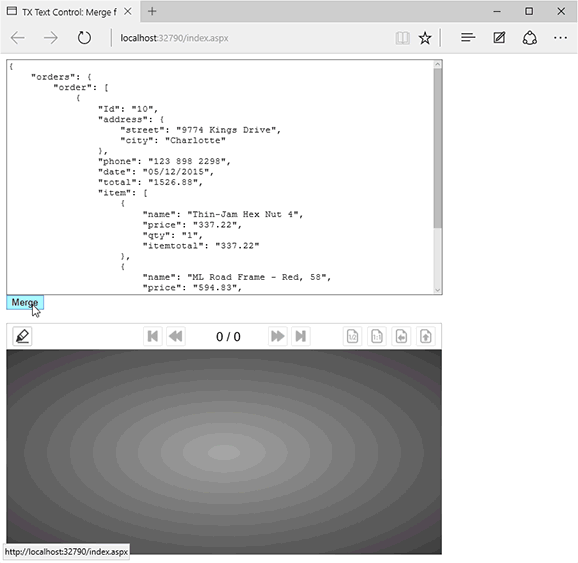In the last article, we explained how to create an ASP.NET Web API to merge templates with JSON data in the payload body of an HTTP request. The focus of this article was on the Web API and RESTful services itself.
Extracted from this project, this sample shows how to merge a template with a JSON string directly. The JSON data string has the following form:
| { | |
| "orders":{ | |
| "order":[ | |
| { | |
| "Id":"10", | |
| "address":{ | |
| "street":"9774 Kings Drive", | |
| "city":"Charlotte" | |
| }, | |
| "phone":"123 898 2298", | |
| "date":"05/12/2015", | |
| "total":"1526.88", | |
| "item":[ | |
| { | |
| "name":"Thin-Jam Hex Nut 4", | |
| "price":"337.22", | |
| "qty":"1", | |
| "itemtotal":"337.22" | |
| }, | |
| { | |
| "name":"ML Road Frame - Red, 58", | |
| "price":"594.83", | |
| "qty":"2", | |
| "itemtotal":"1189.66" | |
| } | |
| ] | |
| } | |
| ] | |
| } | |
| } |
It is the JSON representation of a flat XML file with nested data tables created with Newtonsoft.Json:
| // load the data as XML | |
| XmlDocument doc = new XmlDocument(); | |
| doc.Load(Server.MapPath("sample_db.xml")); | |
| // the Web API expects the data as a JSON object | |
| // 'JsonConvert' converts the XML to the required JSON format | |
| string jsonText = JsonConvert.SerializeXmlNode(doc); |
The following method accepts a template name and the JSON string as parameters. The JSON string is converted back to an XML file which is then converted to a DataSet object.
| private void MergeTemplate(string templateName, string JsonData) | |
| { | |
| // creating a new ServerTextControl and MailMerge class | |
| using (ServerTextControl tx = new ServerTextControl()) | |
| { | |
| tx.Create(); | |
| MailMerge mailMerge = new MailMerge(); | |
| mailMerge.TextComponent = tx; | |
| // load the template | |
| mailMerge.LoadTemplate(Server.MapPath("templates/" + templateName), | |
| FileFormat.InternalUnicodeFormat); | |
| // create a new DataSet object | |
| DataSet ds = new DataSet(); | |
| XmlDocument doc; | |
| // convert the JSON string to an XML document | |
| // object using Newtonsoft.Json | |
| try | |
| { | |
| doc = JsonConvert.DeserializeXmlNode(JsonData); | |
| lblError.Visible = false; | |
| } | |
| catch (Exception exc) | |
| { | |
| lblError.Visible = true; | |
| lblError.Text = exc.Message; | |
| DocumentViewer1.Visible = false; | |
| return; | |
| } | |
| // convert the XML to a DataSet | |
| XmlNodeReader reader = new XmlNodeReader(doc); | |
| ds.ReadXml(reader, XmlReadMode.Auto); | |
| // merge the template with the DataSet | |
| mailMerge.Merge(ds.Tables[0]); | |
| // load the resulting document into the DocumentViewer | |
| byte[] data; | |
| mailMerge.SaveDocumentToMemory(out data, BinaryStreamType.InternalUnicodeFormat, null); | |
| DocumentViewer1.LoadDocumentFromMemory(data, FileFormat.InternalUnicodeFormat); | |
| } | |
| } |
Finally, the document is merged by calling the Merge method. The resulting document is loaded into the ASP.NET DocumentViewer for visualization.

Download the sample from GitHub and test it on your own.

